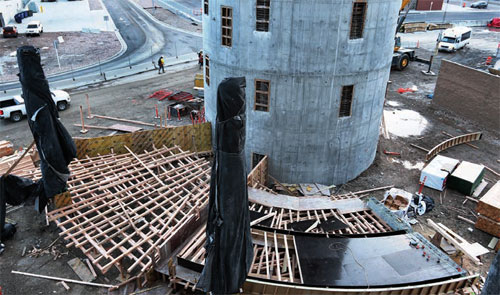By Brice Wallace
With the COVID-19 pandemic dampening or shutting down entire industries throughout Utah and the nation, one remains relatively healthy: construction.
During a recent webinar focused on the virus’ impact on the real estate industry, Rich Thorn, president and CEO of Associated General Contractors of Utah, said contractors are hard at work.
“We’re not aware of any projects that our members are doing in the state of Utah that have been shuttered,” Thorn said during the webinar, organized by ULI (Urban Land Institute) Utah. “That’s on the state level or on the commercial side as well. There may be some. We’re just not aware of it. … Most of our members are still very busy, still looking for additional people to hire.”
Asked about construction starts, Thorn said the number remains strong.
“I’ve not seen any slowdown at this point. … We’re relatively new into this. A month ago, we weren’t having this conversation. But the communications we’ve had from our members here locally, they’re still moving full steam ahead,” he said.
“Now, again, ‘full steam ahead’ is qualified a bit because there are some unknowns at this point, but we’re not aware of any projects that have been scuttled. So we’re optimistic. I think we need to be that way. This could change quickly, but we’re not seeing it at this point from our members.”
Associated General Contractors of Utah has just under 600 members firms that include general contractors and specialty contractors involved in all sectors of the commercial construction industry, including building, highway, industrial and utility/infrastructure, plus service/suppliers. Its members complete over 85 percent of the commercial construction in Utah every year.
While its members remain busy, Thorn said the pandemic has nonetheless affected the industry because of members implementing actions to ensure their safety and well-being.
“Some of the production has been slipping a little bit because we have embraced things like social spacing, making sure that we’ve amped up all of the safety protocols that have been suggested by the CDC (Centers for Disease Control), by the World Health Organization, by local best practices, etc., etc., etc. So some of those things are taking a little bit more time,” he said.
Those protocols are “extraordinary measures,” he added.
Thorn spent a chunk of the webinar defending the concept of construction being deemed an essential activity. He said the construction industry is working to ensure that government leaders understand that concept. He noted that a public health order issued by Salt Lake County Mayor Jenny Wilson listed construction as an essential service and that various construction trade positions are listed as essential as well.
“We feel like we’re clearly outlined as an essential service, and I think that’s probably one of the reasons why you’re seeing construction move forward,” he said. “It’s really, really important. We’re still a major part of the economic sector. …”
His organization has posted a lot of useful information on its website (https://www.agc-utah.org/utah-covid-19) to help contractors navigate the current unusual times and is trying to be nimble in dealing with whatever changes become necessary.
“We’re in challenging times, there’s no doubt. We have never seen anything like this. I’m in my 40th year here at AGC, [and] I can’t remember anything even close to what we’re going through, and it seems like it’s changed so quickly over the past few weeks,” he said.
“It is very fluid. It changes every day. We’re blowing up our members’ inboxes with basically how to do different things.”
The webinar also featured speakers discussing the potential impacts of the coronavirus on commercial real estate. Most believed that the fluid nature of the impacts will result in building owners, mortgage bankers, lending agencies and tenants needing to be flexible in their relationships. Deferrals on rent payments and evictions will become the norm temporarily, they said, and the stakeholders will strive for a continuation of cooperative relationships.
“Be generous,” said Robert Hyde, an attorney at Kirton & McConkie. “We want these tenants back. I think ultimately we’re all looking forward to a recovery and how do we best effect that.”








